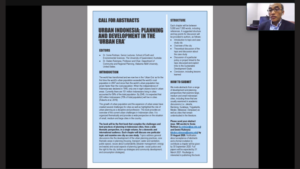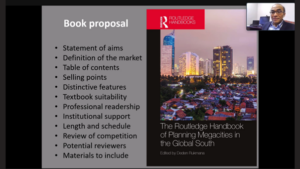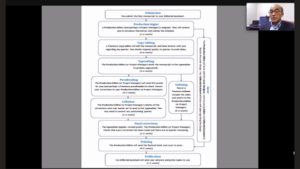This blog follows a webinar by Professor Deden who discussed the process of publishing academic books, from start to finish. The session was moderated by Dr. Mennatullah Hendawy, the research lead at Impact Circles e.V.
The session aimed at discussing publishing academic books, covering various steps from where to begin to the flow of publishing. It was divided into three sections: first, a description of how to publish an academic book with Routledge; then a general understanding of the flow of publishing was given; and finally, queries were discussed, and suggestions were given.

Professor Deden Rukmana, Professor and Chairperson at Alabama Agricultural and Mechanical University, has several experiences of publishing two books with Routledge, a leading academic publisher. In 2020, he published ‘Routledge Handbook of Planning Megacities in the Global South’ (The Routledge Handbook of Planning Megacities in the Global South) which had twenty-nine chapters about seven megacities with sixty-four contributors. In 2022, he published another book, also with Routledge, titled ‘Routledge Handbook of Urban Indonesia’ (Routledge Handbook of Urban Indonesia – Sonia Roitman – Deden Rukmana), co-edited with Sonya Roitman, University of Queensland. On the 13th of December 2022, in a webinar titled “Publishing Academic Books: An Experience with Routledge” hosted by Impact Circles e.V. Impact Circles e.V. is a decentralized organization driving impact through innovation globally. Our tools to make an impact include Entrepreneurial Innovation, Sustainable Digitization, Transformative Coaching, and Applied Research.

‘Call for Abstracts’ poster for academic book on “Urban Indonesia”
How to Publish an Academic Book
Before beginning the process of publishing a book, selecting the theme and having the knowledge of the targeted audience are essential. After finalizing the topic, finding a publisher then comes into the picture. The process of publishing a book may vary according to the type of publisher you choose. For example, publishing with a commercial-academic publisher like Routledge takes a slightly different path than publishing with a university press like Oxford. The publishers usually require authors to submit a proposal outlining the key themes, the central aim of the book, defining the market, etc. However, the final proposal can only be drafted after receiving the chapters from potential contributors. Therefore, reaching out to potential contributors becomes essential after selecting the publisher. Networking can play a vital role in getting to the contributors, and it may be done through social media, professional groups, or emailing prospective contributors.
After receiving the abstracts from the interested contributors, the final proposal can be drafted and sent to the publisher. The book proposal may follow a prescribed template provided by the publisher. The proposal is the gateway to the book; therefore, it should be prepared with good care and detail. The proposal may incorporate the book’s distinguishing features that make it stand out among the others already on the market. Highlighting the book’s vital contributions to scholarship is equally essential.

Template for book proposal
The publisher appoints external reviewers to peer review the proposal after receiving it. However, in the case of a university press, the editor first approves the book proposal, and then after receiving the book, the editor sends it for review. The publishing flow includes submission, production, copyediting, typesetting, and proofreading. The editors can do the proofreading and indexing themselves or avail themselves of these services from the publisher for a fee that may later be included in the royalty. Lastly, the book is ready to be published after making final corrections. Besides the publishers’ promotion, advertising the book through professional channels, reviewers, and social media is vital for better marketing reach of the book.

Flow of book publishing
Discussion
During the webinar, Professor Rukmana provided a range of valuable insights. He shared that there is no limit to the length of the book proposal as long as it provides convincing information for reviewers. He also pointed out that setting a timeframe for completing a book is extremely important, and at least two years are recommended to allocate to complete the book. He also explained the differences between an edited volume and a book, the role of co-authors and how they differ from editors, and how textbooks are aimed at university students and have more straightforward language, while handbooks are more advanced.
The authors should only contact one publisher at a time to ensure the ethics of the publishing. Outdated or irrelevant data can lead to the rejection of the book proposal, outlining that the content should be relevant for the present time in which the book is being produced. If required, translation, indexing, and other tasks are done by editors and authors, and they usually bear the cost.
Professor Deden encouraged readers to continue learning and recommended finding mentors based on their needs and requirements. He also emphasized the importance of actively seeking more mentors to learn from and transferring knowledge to the next generations.
Summary points
- The process of publishing a book involves multiple steps, from planning to action.
- Finalizing the topic of the book and defining a target readership are some of the earliest steps in publishing a book.
- Publishing academic books often involves reaching out to contributors through networking.
- Book proposals need to follow the format of the publishers, and to increase the acceptance rate, they should be framed in a righteous and convincing manner.
- Editors compile the book to a common theme, while authors create specific content.
- Relevance of data and ethical guidelines are essential in making sure the book is published.
- Translation, indexing, and many other tasks still require the authors/editors’ contribution and engagement, ensuring involvement in every step of the process.
- Reading, learning, evolving in the field, and getting guidance from mentors are irreplaceable steps to flourishing as an academician.
A recording of the session is available at https://drive.google.com/drive/u/0/folders/1Fdx0FaznYcqj9NOhJuq3w2I1IhBYGryd , feel free to reach out to Dr. Hendawy (mennatullah.hendawy@impactcircles.org) in case access is needed.
Jerry Matthew
Nitish Kumar
Are you currently involved with regional research, policy, and development? The Regional Studies Association is accepting articles for their online blog. For more information, contact the Blog Editor at rsablog@regionalstudies.org.